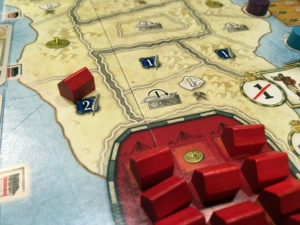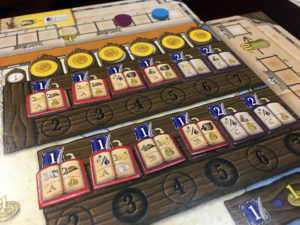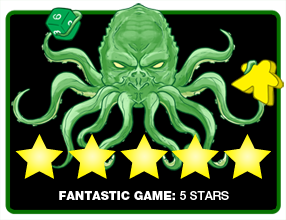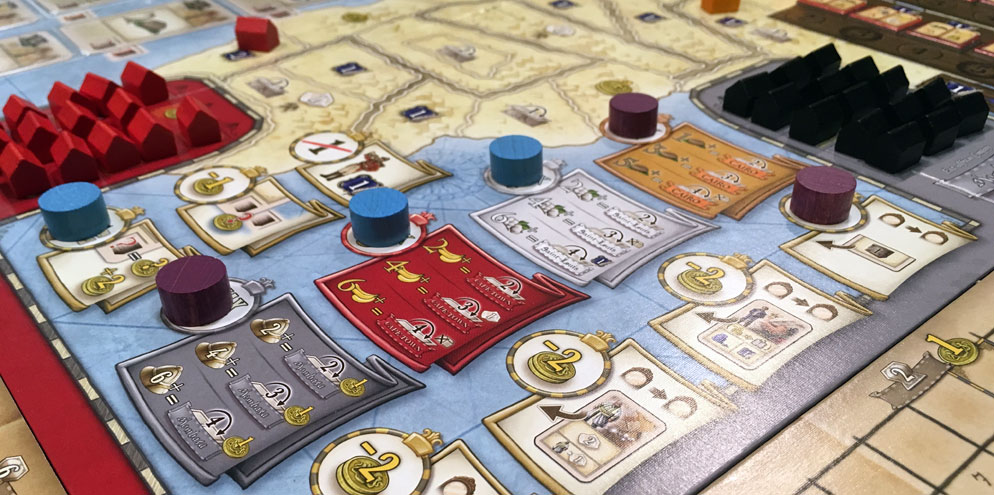 European relations with Africa are a delicate subject. Much like the subjugation of Native Americans in the American West, the colonization and exploitation of sub-Saharan Africa is a tricky theme to get right. Lately, a game has risen to the challenge and delivered something both politically sensitive and unashamedly rife with challenge.
European relations with Africa are a delicate subject. Much like the subjugation of Native Americans in the American West, the colonization and exploitation of sub-Saharan Africa is a tricky theme to get right. Lately, a game has risen to the challenge and delivered something both politically sensitive and unashamedly rife with challenge.
Mombasa is a 2-4 player worker placement euro game that takes about 75-150 minutes to play.
Game Overview:
Mombasa takes place over a period from the European Renaissance to the early Industrial age during which various companies were chartered to acquire trading opportunities and influence in Africa. Players accumulate shares in these companies, manage bookkeeping, obtain wealth, and collect diamond interests to gain points. However, it is worth noting that a statement in the rules makes it clear that Mombasa is not meant to be a “historical simulation”.
Game Components:
Players in Mombasa are given a player board representing their progress on a diamond and bookkeeping track for points at the end of the game. The player boards also offer a focus for arranging played cards (below their board) and previously played cards (above their board).

The main game board represents the map of Africa as trading posts for various companies expand from cities where their headquarters are located: Saint Louis, Cairo, Cape Town, and the eponymous Mombasa. The board also shows worker placement locations, a card display for the purchase of various cards which give players additional resources or actions, and an area for collecting bookkeeping tiles.
The shares in companies that players acquire are represented by progress on separate company tracks placed along the edges of the main board. This progress not only provides points at game end, but could also enable additional actions for worker placement or other bonuses as the track allows. The tracks placed here are variable from game to game. Cards are included to allow players to quickly indicate which tracks should be placed at each orthogonal edge of the board during setup.
The quality of the game play materials for Mombasa is straightforward and functional. The visual imagery stays squarely in the illustrative style with heavy iconography with some decorative embellishments of note throughout. One of the few noticeable components are the small plastic inkpots used for tracking bookkeeping and plastic gems for a player’s diamond track representing a player’s accumulated interests in the diamond trade. Both add a nice thematic touch to the player boards.
How to Play:
After setup, play progresses over a series of rounds, each composed of multiple player turns. At the beginning of each round, players plan out their turns by selecting cards from their hand. These cards are played face down below player boards and are revealed as the round’s main play begins.

During each turn, players will apply the actions or resources available from their selected cards or have the option to place a worker marker in a location on the main board for additional actions. From their played cards, players may use goods to purchase additional cards from the main board display, advance their share progress on company tracks, expand the footprint of a company’s trading houses on the map, or take bookkeeping or diamond actions that advance their respective player board tracks.
Advancing on the bookkeeping track is one of the more complex areas of play. During play, bookkeeping points allow players to choose tiles that are placed on the track. These tiles illustrate requirements of played cards which must be fulfilled for a player to advance on the track. With the play of a bookkeeper card, a player advances along the track as far as possible, as long as those cards have not yet been used. Usually this means a bookkeeper action is taken as one of the first moves of a player on their turn. Compared to the diamond track, bookkeeping is shorter and yields the same amount of points, but takes more time and advance planning to move farther.
Competition on the map is the main mechanism for increasing or decreasing a player’s points from company shares. Share value in the four companies increases and decreases based on the number of trading posts that occupy the map, pulled from a collection which reveals coins as buildings are placed. As players place trading posts, they’re not only expanding a company’s value, they’re also trying to acquire certain bonuses available on the map such as gold or track advancements.
At the end of each round, players do not simply take back all played cards. Players first collect a single stack of previously played cards from above their player board, then move any currently played cards up above to add to their pickup options on a future round. The game proceeds for seven rounds. and at the end of the game, points from company share value, the diamond track, the bookkeeping track, and accumulated coins all add up to a player’s final score.

Game Experience:
At the heart of Mombasa are a number of mechanisms and design decisions which create a deep, enjoyable experience while at the same time, limiting the complexity to a level that belies the intricacy of the interaction. The choices players must make when playing cards, placing workers, and advancing on tracks are both woven in with play on the main board to create situations where calculation of an opponent’s play is an almost certain requirement for victory.
The play options on a turn are relatively simple. The choices can really be boiled down to playing a card or playing a worker, despite the player aid and rules which lay out the actions for each individual type of card played. The card actions are straightforward; the most complicated being the bookkeeping track.

The difficulty of the game lies more in planning upcoming actions by trying to estimate the actions necessary, in the order necessary, to achieve a certain strategic result. Given the fact that cards played are not likely to come back to a player’s hand anytime soon and that players must contemplate when a card will come back to their hand, the planning step invites the most analysis paralysis moments. This almost certainly trips up new players, but once the understanding of the mechanism melds with experience of play, it quickly becomes an intriguing focus of player tension.
Another game element that stands out as simple but producing profoundly different play is the location of the randomized tracks for each game. One quick assessment from the recommended first play setup might make players think that one track is more powerful than another. Yet, put this track in a new position, its new expansion opportunities may prove less than expected.
Compounded with this are the different options that other tracks open up for avenues of play, which can change from game to game, based on the additional opportunities that each other track opens up. One track might grant extra workers, another might give bonuses for selling cards, and still another might give additional track advancements for other tracks.

A third aspect which keeps play intense is the relatively low luck present in the game’s mechanisms. Since the only randomized components of play are the purchase cards and the company tracks, much of a player’s success is due to more optimal actions taken. A player can set up a grand move expanding trading posts or moves on the diamond or bookkeeping track that elicit emotive praise or condemnation from opponents. If one of these plays also benefits other players, the stratagem may even backfire resulting in more potential points for an opponent.
Player turn order does play a factor in card purchases, company expansion, and worker placement blocking, so taking the first player marker at the right time can also be key. This dependency on player agency leaves players feeling as if they are the deciders of success or failure. The feelings of pride in a successful move up a track or huge bonuses collected from trading posts are palpable.
If the low luck makes players feel like they can determine their own fate, experience from play extends this even further. Rare are players who can simply pick up the patterns of play of Mombasa and in their first game, best a seasoned opponent. Due the nature of how to plan turns over rounds by selecting cards, one or two games are necessary to understand the nuances of the implications of play. Add to this that players who gain experience with the different tracks will also be able to understand the relative importance of one track’s position over another.
Avoiding bookkeeping altogether is an option, but players that more successfully assess the bookkeeping track’s potential can accumulate points quickly if the right tiles are available. By combining the reward of experience with the varying tracks, it takes a long time before Mombasa outstays its welcome.

Where Mombasa might turn off players is in its aggressive play style. This is not a game of multiplayer solitaire. Players must consider the options and future choices of their opponents if they are to succeed. If rounds proceed without any direct competition or disruption of strategy, Mombasa can seem perfunctory. At times, players who want to be “nice” might hesitate from a ousting a trading post because it directly reduces the points of their opponents. These types of reservations should be left aside and the direct confrontation should be embraced for Mombasa’s core style to be enjoyed.
Unfortunately, all of the intricacy of play does result with one major frustration, instruction time. Explaining the actions available and track progress is not difficult, but it is a lot to absorb in a short time. There are also a few exceptions and small rules which have big implications in play. If these rules and caveats are unmentioned during rules explanation or unremembered by players during play, it could offset an entire strategy because of one misplay. Although this frustration is not a fault of the game since everything is explained well in the rules, it does bear mentioning because successive plays often have players remembering to remember certain rules. All of this would be really detracting if Mombasa’s gameplay was anything other than stellar. These are bumps rather than roadblocks.
Final Thoughts:
Mombasa ultimately shines bright for players who enjoy an aggressive, near combative economic game with simple elements that yield complex considerations in play. The frustration in planning is matched only by the tension of competition for resources and track progress.
While many other Euro games mainly present a puzzle to navigate or an engine to build, Mombasa demands that players keep close watch over opponents’ strategy to counter moves and find avenues for points that aren’t shared. As the game style also changes based on the variables in play, strategies must change.
Although this may cause game instruction time to be lengthy, how to play mechanically becomes near simplistic yet the implication of choices remain complex. After one play, the revelation of how many options there are to consider is awe-inspiring. Mombasa indeed achieves something more than the sum of its parts.
If you’d like to pick up a copy of Mombasa, you can get it for about $35.
Final Score: 5 Stars – For fans of deep, satisfying Euro gameplay with a strong encouragement of countering opponent strategies, this is a must-play title.
 Hits:
Hits:
• Simple play but deep choices
• Track variations change play style
• Successive plays reward experience
• High player-driven tension
• Relatively low luck
Misses:
• Instruction time























